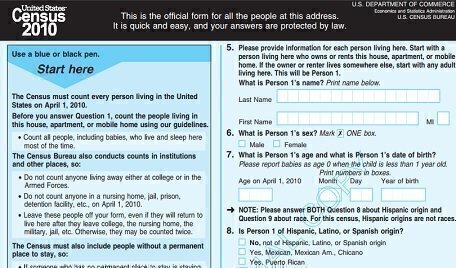Only hours before a crucial hearing in a federal trial court, the Trump Administration on Monday evening urged the Supreme Court to halt all further proceedings in the case, which tests the constitutionality of asking everyone in America about their citizenship, as part of the 2020 census. The Court has refused twice before to block that trial.
 The trial is close to being finished, but both sides are scheduled to appear in U.S. District Court in New York City Tuesday morning, for a lengthy hearing on closing legal arguments on a variety of legal issues that must be resolved before the judge moves forward to make a final ruling on the citizenship inquiry.
The trial is close to being finished, but both sides are scheduled to appear in U.S. District Court in New York City Tuesday morning, for a lengthy hearing on closing legal arguments on a variety of legal issues that must be resolved before the judge moves forward to make a final ruling on the citizenship inquiry.
Both sides last week filed lengthy closing legal briefs, each more than 500 pages long, to set the stage for the Tuesday hearing. In response to those final written arguments, U.S. District Judge Jesse M. Furman on Monday issued an order spelling out all of the issues he wants explored in the closing arguments in the courthouse in lower Manhattan.
Among those issues are whether the key official in planning the next 10-year census – Commerce Secretary Wilbur Ross – had chosen to add the citizenship question out of a discriminatory hostility to immigrants, seeking to induce many of them to avoid even responding to the census by asking them to identify their citizenship. Under the Constitution, everyone must be counted, whether citizens or not and whether they are in the country legally or not.
At the end of the Tuesday hearing, the judge indicated, he will decide whether there will be any need for filings of new written arguments before he moves on to make a final decision.
In asking the Supreme Court to put a halt to the trial, federal government lawyers argued that Judge Furman’s continuing activity in the trial could interfere with the review that the Supreme Court has now promised on one facet of the case. The Justices have agreed to decide during their current term what types of evidence the trial judge may consider in making his decision on the citizenship dispute.
Judge Furman should not be allowed to move forward at all, until after the Supreme Court reaches its decision on that controversy about evidence, the government letter argued. The kind of evidence that the government wants excluded tends to be some of the strongest to suggest that adding the citizenship question may be invalid.
That question is being challenged by a group of state and local governments, whose jurisdictions include many residents who are immigrants, including those who entered the country illegally. The challengers argue that probing their citizenship will discourage many of them from even responding to the census, out of fear of deportation, and that would result in a significant under-count of states’ actual population.
The population data gathered by the census are used in dividing up how many seats each state gets in the U.S. House of Representatives and are also a factor in controlling where billions of dollars in federal funds are spent.
It is unclear whether the government’s new delay request arrived at the Supreme Court in time to have an effect on the scheduled hearing Tuesday. But, if a delay is granted at some point by the Justices, it would mean that Judge Furman would have to forgo making a final decision until after the Supreme Court spelled out what evidence he may consider.
Lyle Denniston has been writing about the Supreme Court since 1958. His work has appeared here since mid-2011.







